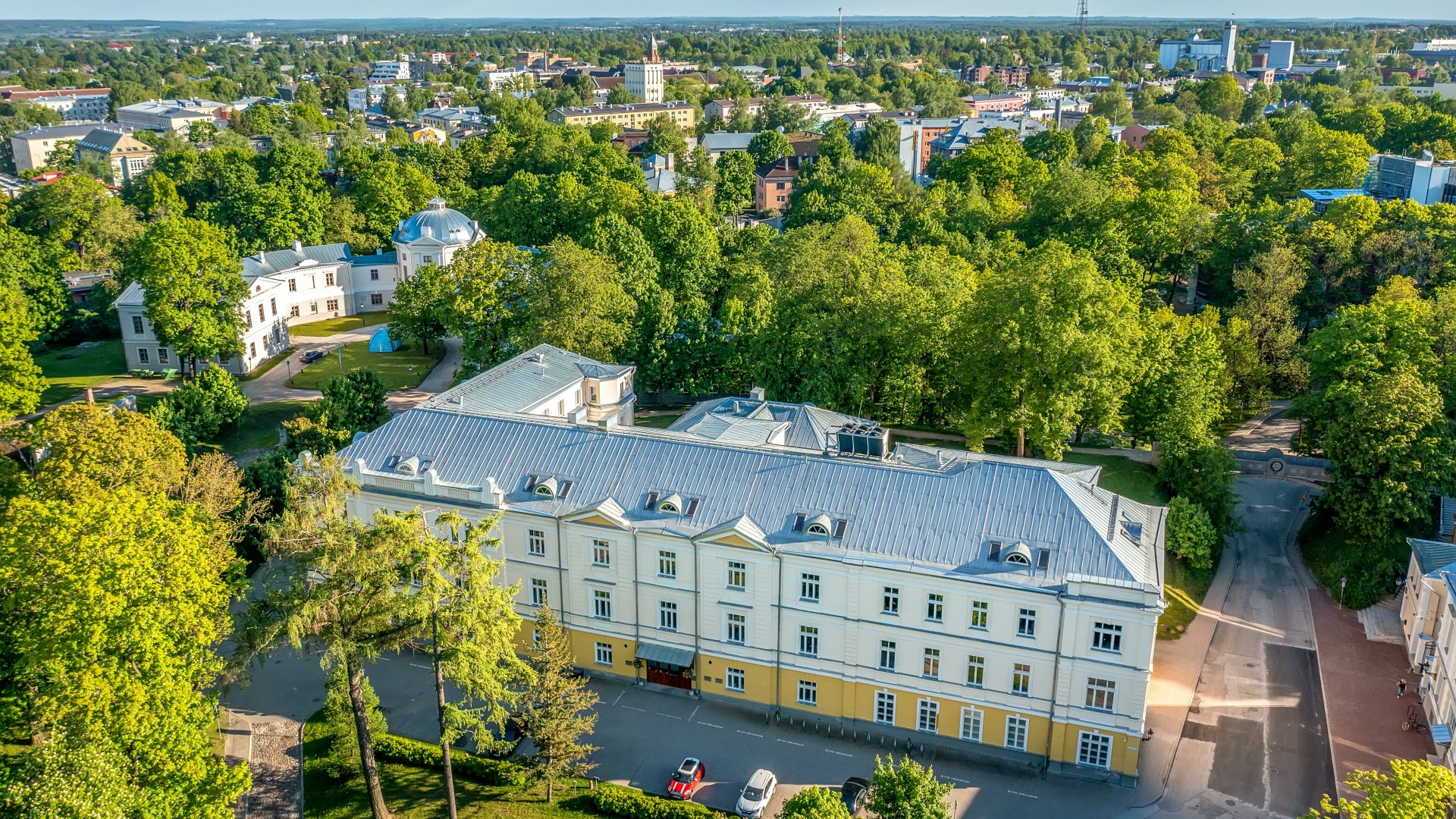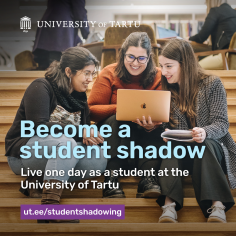International Relations and Regional Studies
Master's
2 January
Application system opens
15 March
Application deadline
30 April
Admission results
1 September
Academic year starts
Level of study
Master's
Study language
English
Duration and credits
2 years
, 120 ECTS
Form of study
Regular study
Location
Tartu
Student places
20
Tuition fee
4,200 EUR/year
Tuition waivers
5 for citizens of EU/EEA/Switzerland, 8 for all citizenships
- The University of Tartu is ranked in the top 230 universities in the world in politics (see Rankings and Surveys).
- Become an expert in one of the geographical regions: the European Union, Russia and Eurasia, or the Baltic Sea region. Gain an in-depth understanding of international relations and political practices in these regions.
- Extensive practical knowledge is acquired through field trips to conflict zones and international organisations.
- After graduation, you can work in foreign ministries and other governmental bodies, the EU institutions, lobby groups, journalism or academia.
The International Relations and Regional Studies master's programme combines a comprehensive study of international relations as an academic discipline and political practice with an in-depth understanding of particular geographic regions, including the European Union, Russia and Eurasia, and the Baltic Sea region. The programme is a good fit for all those aiming for a career with an international focus, be it in diplomacy, public service, private sector or with non-governmental organisations and academia.
How do states, international organisations and other actors pursue their interests, reinforce their identities and interact with one another in a complex and volatile international environment? How effective, adequate and fair are regional and global norms, rules, and institutions that regulate such interaction, and how can these be upheld and improved? Bridging academia and the "real world", our programme emphasises acquiring knowledge and applying it.
The programme provides extensive knowledge about contemporary international relations, traditional and critical approaches to security, foreign policy analysis, conflict management and resolution mechanisms, international law, and politics, society, and international relations in the EU, Russia and Eurasia and the Baltic Sea region. These regions grow out of our faculty's research interests and reflect Estonia's historical experience at the border of Europe and Russia - an experience which is highly relevant to other countries located in-between bigger powers.
Since 2021 the "European Union – Russia Studies" programme has become part of the International Relations and Regional Studies programme.
What will you get from this programme?
The versatile curriculum ensures that graduates emerge with a comprehensive understanding of international and regional issues and have a wide variety of skills and competencies that enable them to research, discuss, and address these issues effectively.
Wide-ranging study-abroad opportunities enhance the international dimension of the programme. The Institute has numerous agreements which enable students to spend a semester at a university abroad.
All the knowledge I gained while studying there has been immensely valuable for my current job - my duties in my current position revolve around forming Latvia's viewpoint on EU legislation in the fields of culture and audiovisual matters being drafted in the corridors of Brussels. I have the University of Tartu to thank for my analytical skills and research methods improvement, as well as my capabilities of critically assessing and making sense of political developments worldwide and more locally in the Baltic Sea region. There were a lot of courses that improved my general understanding of political processes and international relations between various state and non-state actors. I encourage you to take in everything you can from the time you're in Tartu. There is so much to gain, both academically and in general. Tartu is a fantastic city with a vibrant cultural life and a student vibe like nowhere I have ever been. Take it all in; you will not be able to step into that same river again.
Learning outcomes
The learning outcomes of the programme include:
- comprehensive understanding of core IR concepts, approaches, and practices, including familiarity with international law, the global economy, and international security arrangements;
- detailed knowledge of a specific geographical region (the EU, Russia and Eurasia, Baltic Sea Region);
- ability to identify and formulate meaningful research problems and/or questions in the field of International Relations, and the theoretical, analytical and methodological competencies to effectively address these;
- specific knowledge, skills and norms relevant to the practice of international relations (e.g. conflict mediation, negotiations, skills relevant to foreign and security policy formulation and implementation);
- a range of general-purpose skills (e.g. effective oral and written communication skills, critical thinking, responsibility, initiative, leadership and teamwork skills);
- an international perspective that will enrich your career prospects both at home and globally.
Why study International Relations and Regional Studies at the University of Tartu?
Our research and teaching in the field of IR is internationally visible and recognised placing us among the top IR schools in Eastern and Central Europe.
Our record of extensive international collaboration with universities in the U.S. (George Mason University, George Washington University), various universities in Europe, and major international academic networks (e.g. PONARS-Eurasia, EISA, CEEISA) translates into excellent prospects for various partnerships in the realm of teaching.
We believe that in the current international context, learning about IR in one of the smallest EU member states which is situated at the centre of the Baltic Sea Region and on Russia’s doorstep has the potential to offer unique insights into international politics.
Since 1989, Estonia has been in the centre of democratic, economic and geopolitical change in Eastern Europe. The University of Tartu has played an active role in charting these developments.
In academic scoreboards, The University of Tartu belongs to the top 350 universities in the world (see Rankings & Surveys).
The University of Tartu offers advanced study facilities, excellent libraries, well-equipped computer labs and modern residence halls. Interactive and innovative teaching and learning methods are widely used. There is a wide variety of opportunities to study abroad, including Erasmus agreements with a broad range of European partner universities.
Studying in Tartu is both attractive and affordable – it means high-quality education at a low cost in a country that is simultaneously both ancient and very modern, close to nature and technologically advanced, proud of its unique culture and traditions and open to the world (Estonia is a member of the EU and NATO and it belongs to the eurozone and the Schengen space).
Follow us on Facebook.
Programme highlights in video
- Watch the programme director talk about the master's programme in International Relations and Regional Studies during Virtual Open Day 2024.
- Watch the presentation about International master's admissions by the Head of International Admissions during Virtual Open Day 2024.
Regional modules of the programme
European Studies
This module provides in-depth knowledge about EU institutions and policy-making processes, the historical evolution of the Union, and key theoretical debates on European integration. It offers an introduction to EU law while covering contemporary issues and challenges in EU politics.
EU-Russia Studies
This module provides the analytical tools to critically read and interpret the political, historical, and institutional developments in Russia, the European Union, and their shared neighbourhood. It offers an in-depth comparative and specialised perspective on their mutual relationship and the practical skills to assess its development.
Russian and Eurasian Studies
This module introduces Northern Eurasia as a vast and diverse region, which has been shaped by competing imperial orders, the Soviet experiment and the recently attempted democratisation. By focusing on the current political, economic, and social trends in this region, this module highlights its uniqueness and role in global developments.
Baltic Sea Region Studies
This module introduces the most dynamic and integrated area in Northern Europe that includes the Baltic states, Nordic countries, Germany, Poland and Russia. It offers a conceptual toolbox to analyse and comprehend the developments in the Baltic Sea region both in political and economic terms.
Course and module details
This programme structure is the latest one confirmed by the university. Next year's modules will be updated by 15 April. Significant changes to the programme will be announced in advance on this website. Check the Study Information System for the latest updates.
Curriculum version:
This curriculum structure is the latest one confirmed by the university.
Next year's version will be entered into the Study Information System by 15 April.
Significant changes to the structure will be announced in advance on this website.
More info: Study Information System
More info: Study Information System
People
Our faculty is highly accomplished in scholarship and teaching, with wide-ranging expertise in international relations and regional studies. Our staff encompasses people from nearly a dozen nationalities, offering students a multi‐faceted perspective on international and regional developments and problems. Our multinational teaching team values an interactive and non-hierarchical approach with students.
The faculty's research themes include:
- critical geopolitics; territoriality and sovereignty issues; de facto states dynamics (Prof. Eiki Berg)
- Biopolitics; Russian foreign policy discourses; soft power and international security (Prof. Andrey Makarychev)
- European studies, regional integration, populism and political ideologies (Dr Stefano Braghiroli)
- EU's foreign and security policy (Mr Thomas Linsenmaier)
- international political economy and de facto states engagement (Dr Raul Toomla)
- Baltic Sea region politics (Dr Heiko Pääbo)
- European integration; Europeanization; Baltic-Russia relations (Dr Piret Ehin)
To combine academic quality with "real world" application, we involve stakeholders and decision-makers with key national and international responsibilities, such as the Estonian Members of the European Parliament, national and European policy-makers, and ambassadors.
Facilities

Johan Skytte was the initiator of the idea of founding a university in Tartu, and since 1632, the first chancellor of Tartu University. In his inaugural address, he said that besides noblemen and burgesses the peasants, too, should have the right to study at the university. Jakob Skytte, the son of Johan Skytte, was a student of the University of Tartu, and at the same time the first rector of it.
Read more about the Johan Skytte Institute of Political Studies.
After graduation
The master's programme in International Relations and Regional Studies prepares you for a wide range of careers in international affairs, including work for national governments, international organisations, non-governmental organisations and the private sector. Our graduates work, for example, in the national Foreign Ministries and other governmental bodies, EU institutions, lobby groups, and in journalism or academia.
Alumni insights
Image

Mara Sofia Crăciunescu, an alumna from Romania, graduated from the master's programme in International Relations and Regional Studies.
What is the most memorable experience from your studies at UT?
All my memorable experiences were possible due to the great community of people living in Tartu, both locals and expats, from passionate and enthusiastic professors who guided our academic paths and contributed to an unforgettable student life to the International Student Ambassadors and ESN Tartu volunteers that gathered all the international students and helped them settle and enjoy their second home.
What do you think is important to know about your programme?
The programme is student-oriented, and it helps develop both hard and soft skills. It combines theory with practice, encouraging the students to make presentations, debates and simulations. What I appreciated the most were the specialisation modules, which allowed me to study the geopolitics of a specific region in-depth.
What kind of hands-on or practical experiences have you had in and outside the classroom?
The internship under the supervision of Prof. Shpend Kursani, the volunteering programme International Student Ambassadors and attending various conferences and debates contributed to both my professional and personal development. In my day-to-day work as an international affairs analyst, I use the skills I developed during these activities, such as research, analytical thinking, communication and teamwork.
If you could give advice to new students, what would it be?
Don't overthink, and don't underestimate the power of networking. Ask that question during the seminar; you will see that other coursemates were wondering the same thing. Go to that party; you will meet your future best friends. Travel outside of Tartu; you will discover incredible places. Join that volunteering opportunity or extracurricular course; you will find like-minded people with whom you can develop your skills and passions!
Admission requirements for International Relations and Regional Studies
- bachelor’s degree or equivalent qualification (must be obtained by the end of July) – please see our country-specific document requirements
- English language proficiency – please see our acceptable tests and exempt categories
NB! The restrictions for the citizens of the Russian Federation are specified here.
Applications are evaluated based on
- average grade* of the previous study level (yields 50% of the final score)
- the score of the admission interview (yields 50% of the final score)
* To apply, the average grade must be at least 60% of the maximum.
Admission interviews take place on: 3-6 April 2025
Candidates with an average grade (GPA) of at least 60% in the previous study level will be invited for the interview.
The interview will last about 20 minutes and will be held electronically. The invitation with the online link will be sent to the candidate a few days prior. In the interview, the candidate should be ready to discuss their motivation to take up studies in the International Relations and Regional Studies MA programme. The candidate should be able to describe their interests in relation to the study programme and be ready to give a brief overview of their planned MA thesis. We will also inquire about the candidate's preparedness to adjust to (a new) academic and cultural environment.
The maximum score for the interview is 100 points. Each interview will be evaluated based on the following criteria:
- Motivation and ambition (30%);
- Identification of specific research interests compatible with the substantive content of the programme, ability to formulate a research problem/topic (50%);
- Oral skills in English language (20%).
For each assignment, the maximum score is 100 points. NB! The applicant needs to have an average grade of at least 60% of the maximum possible, in order to qualify for the admission interview. The result of the admission interview is considered positive if the applicant scores 51 points or more. After the interview, the final admission score is calculated. The total admission score will be the weighted sum of the average grade and the interview. The maximum number of final points is 100. Only applications which receive 66 points and above as a combined score from both indicators will qualify for admission.
Further information on assessing candidates´ academic performance and calculating admissions´ score.
How to apply
The following information applies to international students and Estonian students who graduated abroad:
The application system opens on 2 January and closes on 15 March. The following documents must be submitted electronically via DreamApply by 15 March:
- online application
- official certified copy of the bachelor's diploma or its equivalent and Diploma Supplement (transcript) in the original language (must include a description of the grading scale).
NB! Applicants graduating in the upcoming spring/summer and having their diploma and final transcript issued later than the application deadline should electronically submit their most recent official transcript by the application deadline. The transcript should be supplemented by an official statement from the issuing institution indicating current enrollment and expected graduation date. Admitted candidates are required to post certified copies of their graduation documents as soon as these have been issued (must reach us no later than by the end of July). - official translation of the bachelor’s diploma and Diploma Supplement (transcript) into English, translation certified
- proof of English language proficiency
- copy of the passport page stating the applicant’s personal particulars
- confirmation/receipt of application fee payment (if applicable). All international applicants are required to pay the application fee EUR 100, unless they have completed the previous study level in Estonia. An application will only be processed after the fee has been received by the UT.
Submitted applications can not be edited. It is only possible to upload new documents (e.g. graduation certificates). Applicants will receive feedback and notifications through the DreamApply system to their e-mail. Incomplete applications or those submitted by e-mail will not be considered for admission.
Guide to submitting an electronic application on DreamApply
NB: The University of Tartu has no official partnerships with agents or educational representatives. We strongly recommend applying directly to the university without the help of unauthorised third-party entities. Should you use such a service, please ensure that your application's contact information is your personal details (your e-mail, phone number, etc.).
The evaluation of applications will be made based on the electronic copies added to DreamApply. A general ranking list will be formed based on the electronically submitted applications and admission results (including offers) will be announced to all applicants personally via DreamApply by April 30 at the latest. Admitted candidates are expected to accept or decline the offer in DreamApply in 7 days. If the decision is not communicated to UT via DreamApply by the stipulated deadline, UT reserves the right to withdraw the admission offer.
NB! It is not possible to postpone the beginning of studies to the next academic year.
Terms and conditions of the admission offer
Admission offers are conditional. This means that there are conditions in the offer which the applicant needs to fulfil in order to be admitted (e.g. sending application documents by post; obtaining the required level of education). If the conditions are not met, UT has the right to withdraw the offer. Also, UT reserves the right to withdraw or amend any offer or revoke the matriculation of a student, if it becomes evident that the application contains fraudulent information, the qualification does not provide access to the chosen study programme or the student is found to have omitted key information from the application. Should such circumstances occur, UT will not be liable for any material or immaterial loss which the student may suffer as a result.
Once the admission results have been announced, all admitted students are required to send the application documents by post to: Student Admissions, University of Tartu, Ülikooli 18-133, Tartu 50090, ESTONIA.
The documents are expected to be mailed only by those receiving the admission offer (unless instructed otherwise by the admissions staff). The documents must reach the university within 3 weeks from the announcement of the offer. If the application documents do not reach us by the deadline, the university has the right to withdraw the admission offer. Applicants will be informed when their documents have arrived.
Requirements for educational documents
All copies of educational documents (diplomas and Diploma Supplements/transcripts) must be officially certified. By certified we mean that the copies should bear an original signature and seal of the authority certifying that these are true copies of the original document(s). The copies can be certified either 1) by an authorised official of the issuing institution, or 2) by a notary, or 3) with an Apostille attached. NB! Country-specific requirements may also specify the way documents from certain countries must be certified.
Please note that UT does not accept simple copies made on the basis of already certified copies (primary copies are needed).
All admitted students are required to present their original qualification certificates upon arrival (unless these were sent directly from the issuing institution).
Paying the tuition fee (applicable to those receiving a fee-based study place offer)
- EU/EEA/Swiss citizens are required to pay the fee for the first semester once they arrive in Tartu (by 20 September at the latest after signing the fee contract, please read more here).
- Admitted students from other countries are required to pre-pay half of the first semester's tuition fee. The invoice along with the pre-payment deadline and payment details will be sent to applicants via DreamApply after they have accepted the admissions offer and the University has received the hard copies of the application documents. Second part of the fee is due on 20 September. NB! The official admission letter (necessary for visa application) will only be issued once the University of Tartu has received the pre-payment.
- NB! Once you have been offered a fee-based study place, be aware that it will not be changed into a fee waiver study place. By transferring the pre-payment to the university, you confirm that you have informed yourself about the process of the visa and temporary residence permit application and you are able to arrive in Estonia by the start of the academic year. If you have any questions please contact studentvisasupport@ut.ee.
The official admission letter will be sent to admitted students electronically via DreamApply only after the admissions office has received and reviewed hard copies of the application documents, and received the tuition fee pre-payment (if a pre-payment was required, please see step 3 for more details).
NB! The electronic admission letter is also sufficient for non-EU students for applying for visa/residence permit at an Estonian embassy.
Once the admission letter is issued, accepted students may proceed further with arranging their arrival. All non-EU students should first consult information on the process of visa and temporary residence permit application to be sure, as where and when the relevant documents need to be applied. Note that housing at the UT dormitories can be applied during a limited period of time, unless specified otherwise on the website.
NB! Admitted students who are not citizens of an EU or EEA country or Switzerland need to make sure they obtain the Estonian long-term visa on time in order to be able to participate in the orientation programme for international students held in the last week of August. They are also required to visit the Admissions Office in person to complete their arrival registration by September 1, 2025, at the latest. Failure to do so will result in the revocation of their admission decision and visa.
For housing alternatives please find further information on Tartu Welcome Centre website. Travel information can be found here. Based upon common queries, the most important information has been summarised into a pre-arrival information website UT Getting Started.
Estonian applicants should apply via National Admission Information Systems (SAIS). Further information in Estonian is available here.

07.02.2025





